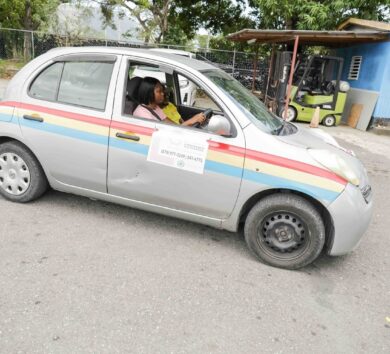

The National Helmet Wearing Coalition (NHWC) has begun its groundwork to unearth the knowledge and attitudes underpinning and driving unsafe road practices among motorcyclists.
The coalition recently uncovered some of these attitudes during a workshop with a cohort of 17 cyclists and pillions, ages 18 to 29, in Petersfield, Westmoreland. The event was facilitated by noted sociologist and capacity-building specialist, Georgia Crawford.
From the belief that death is ‘predetermined’ regardless of safety practices, to not wanting helmets to disturb new hairstyles, participants outlined various reasons for non-adherence to helmet-wearing and other safety gear.
“If yuh fi drown, yuh cyah hang,” one participant quipped as he underscored that many motorcyclists are accepting of death hence their emphasis on thrill and disregard for safe practices.
Others cited discomfort, vision obstruction and concerns about theft and storage of helmets as reasons for not wearing one.
“I think the reason why some females don’t wear helmets is because they don’t want their hairstyle to mess up or the helmet may feel uncomfortable,” surmised a female participant.
The participants outlined their various reasons for not wearing a helmet, however, Crawford emphasised that helmet-wearing is necessary to stem the high number of deaths among motorcyclists, particularly in Westmoreland, where motorcycle fatal crashes are higher than in other parts of the country.
According to the Island Traffic Authority’s 2023 annual traffic crash report, Westmoreland accounted for 13 per cent of Jamaica’s road fatalities, with a quarter of all motorcycle-related fatalities occurring in the parish.
The workshop was used as an information-gathering session to determine what behaviour, knowledge, attitudes and practices were among the participants as well as to encourage more motorcyclists to wear helmets.
The participants recommended lighter but adequately secure helmets; providing an initial number of helmets at no or minimal cost; and stronger enforcement by law enforcers, as measures to encourage compliance.
The ideas complemented some of the findings of a country-wide survey commissioned by the NHWC and conducted by the Don Anderson-led Market Research Limited shortly before the launch of the coalition in March. The findings indicated that nearly a third of bikers believed more stringent law enforcement (fines and penalties) would drive compliance, while 26 per cent said an increase in the availability of helmets would promote helmet use, and 25 per cent believed affordable helmets would improve adherence.
Following the discussion and the piloting of a few helmet safety messages, some participants committed to always wearing helmets when riding.

Sydoney Preddie, project manager for road safety and road user education at JN Foundation, underscored the importance of continual community-based dialogue in instilling behaviour change and improving road safety practice.
“These interventions will form an integral part of the strategies we will employ to gather baseline data and address needs,” she said.
She added that workshops are robust platforms for constructive dialogue and for brainstorming strategies that promote helmet use and safe riding practices.
“We are happy that participants actively discussed integrating road safety education into school curricula, launching helmet-wearing campaigns, and creating community-based incentives for adherence to safety measures,” Preddie continued, disclosing that Westmoreland, a parish with alarming rates of road fatalities, particularly among motorcyclists, was strategically chosen for the workshop.
Her colleague, Omar Wright, lead for environment and community development programmes at the JN Foundation, also emphasised the value of workshops in understanding the concerns of motorcyclists directly. He said the NHWC will be relying on these activities to drive behavioural change among youth and young adults by addressing their real concerns and needs regarding helmet usage.
“The workshop reflects the commitment of the JN Foundation, in partnership with the National Road Safety Council, to promote road culture that prioritises safety to reduce motorcycle-related fatalities across Jamaica. By fostering dialogue and understanding, initiatives like the NHWC strive to create a safer environment for all road users,” he explained.
The JN Foundation is the implementing partner overseeing and managing the projects of the NHWC.







Comments